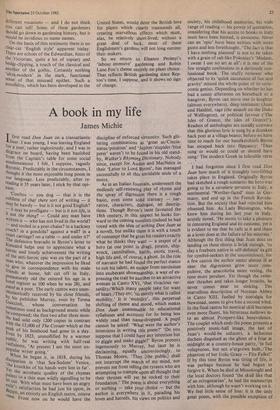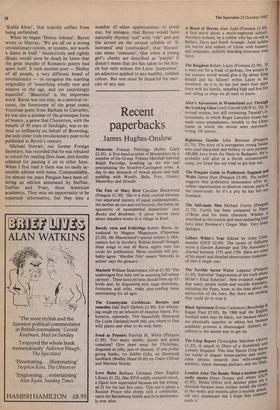A book in my life
James Michie
Ifirst read Don Juan on a transatlantic liner. I was young, I was leaving England for a year, rather ingloriously, and I was in disgrace on board, having been banished from the Captain's table for some social misdemeanour. I felt, I suppose, vaguely Byronic. Predictably in the circumstances, I thought it the most enjoyable long poem in our language. Less predictably, after re- reading it 35 years later, I stick by that opi-
nion, `Confess — you dog — that it is the sublime of that there sort of writing — it may be bawdy — but is it not good English? it may be profligate — but is it not life, is it not the thing? — Could any man have written it — who has not lived in the world?
and tooled in a post-chaise? in a hackney coach? in a gondola? against a wall? in a Court carriage? on a table — and under it?' The defensive bravado in Byron's letter to kinnaird helps one to appreciate what a heroic and lonely achievement the writing of the anti-heroic epic was on the part of a Man who, whatever the impression he liked to give in correspondence with his male friends at home, felt cut off in Italy, Prematurely old (he entered his age in a hotel register as 100 when he was 28), and Passe as a poet. The early cantos were unen- thusiastically received by his close friends, by his publisher Murray, even by Teresa Guiccioli, whose conversation he he used as background music while fle composed; the first two after three mon- ths had sold only 1200 copies in contrast With the 13,000 of The Corsair which at the Peak of his lionhood had gone in a day. Even by 1823, unmollified by a warmer Public, he was writing with half-real ruefulness, At present I am the most un- PoPular writer going.' When he began it, in 1818, during his dissipation in 'that Sea-Sodom' Venice, Yet knuckles of his hands were lost in fat'. re!. the acrobatic quality of the rhymes Points to a thin man wildly signalling to be let. out. With what must have been an angry exile's satisfaction he had just hit upon, in a ePP0, an entirely un-English metre, ottava lima. From now on he would have the
discipline of enforced virtuosity. Such glit- tering combinations as 'great as/Cincin- natus/potatoes' and `Jupiter/stupider/blue peter' weren't to be found in his old stand- by, Walker's Rhyming Dictionary. Nobody since, except for Auden and MacNeice in their 'Letter to Lord Byron', has managed successfully to sit this unridable mule of a metre.
As in an Italian fountain, underneath the endlessly self-renewing play of rhyme and the spray of digression there is a rough basin, even some solid statuary — nar- rative, characters, dialogue, set descrip- tions. Though Byron's taste favoured the 18th century, in this respect he looks for- ward to the coming novelists (indeed he had toyed with the idea of writing Don Juan as a novel), but unlike them it is with a touch of contempt that he gives his readers exactly what he thinks they want — a sexpot of a hero (at one point in drag), pirates, ship- wreck, cannibalism, battle, exotic travel,. high life and, of course, a ghost. In the role of narrator he had found the perfect stance to suit his talent, an escape from narcissism into exuberant showmanship, a way of ex- pressing the trait he ascribes to an attractive woman in Canto XVI, 'that vivacious ver- satility/Which many people take for want of heart./They err; 'tis merely what is called mobility.' It is 'mobility', this perpetual shifting of theme and mood, which makes Don Juan unamenable to educational syllabuses and accounts for its being less widely read than name-dropped. A pupil cannot be asked: 'What were the author's intentions in writing this poem?' Do you suppose that I could have any intention but to giggle and make giggle?' Byron protests ingenuously to Murray, but later he is declaiming, equally unconvincingly, to Thomas Moore, 'They [the public] shall not interrupt the march of my mind, nor prevent me from telling the tyrants who are attempting to trample upon all thought that their thrones will yet be rocked to their foundation.' The poem is about everything or nothing — take your choice — but the author is everywhere in it, parading his loves and hatreds, his views on politics and
society, his childhood memories, his wide range of reading — his power of quotation, considering that his access to books in Italy must have been limited, is awesome. Never can an 'epic' have been written with more gusto and less forethought. 'The fact is that I have nothing planned' is not to be taken with a grain of salt like Polonius's 'Madam, I swear I use no art at all': it is one of the few straight confessions in a deviously con- fessional book. The stuffy reviewer who objected to its 'quick succession of fun and gravity' missed the whole point of its serio- comic genius. Depending on whether he has had a sunny afternoon on horseback or a hangover, Byron can move one to laughter (almost everywhere), deep sentiment (Juan and Haidee), rage (the assault on the Duke of Wellington), or political fervour (`The Isles of Greece, the isles of Greece!'). Readers of anthologies arc usually unaware that this glorious lyric is sung by a drunken hack poet at a village beano; before we have time to reach for our handkerchiefs Byron has escaped back into flippancy: 'Thus sung or would or could or should have sung/ The modern Greek in tolerable verse . . .
I had forgotten since I first read Don Juan how much of it (roughly two-fifths) takes place in England. Originally Byron had sketched a rough scenario: his hero was going to be a cavaliere servente in Italy, a sentimental 'Werther-faced' man in Ger- many, and end up in the French Revolu- tion. But the society that had rejected him obsessed him. As Lady Blessington, who knew him during his last year in Italy. acutely noted, 'He seems to take a pleasure in censuring England and its customs, yet it is evident to me that he rails at it and them as a lover does at the failure of his mistress.' Although the first thing that Juan does on landing on these shores is brisk enough, `to slay a freeborn native in self-defence' (a gift for symbol-seekers in the unconscious), for a few cantos the author seems almost ill at ease: the digressions grow more com- pulsive, the anacolutha more vexing, the tone more petulant. Yet though the swim- mer thrashes and takes longer breaths, he never comes near to sinking. The marvellous description of Norman Abbey in Canto XIII, fuelled by nostalgia for Newstead, seems to give him a second wind. In the final cantos his metrical skill becomes even more fluent, his bitterness mellows in- to an almost Prospero-like benevolence. The couplet which ends the poem presents a positively music-hall image, the last of Juan's would-be seducers, a lecherous duchess disguised as the ghost of a friar at midnight at a country-house party, 'in full voluptuous, but not o'ergrown bulk,/The phantom of her frolic Grace — Fitz-Fulke!' If by this time Byron was tiring of life, it was perhaps because he had begun to forgive it. When he died at Missolonghi and the local doctors found 'the skull like that of an octogenarian', he had the manuscript with him, although he wasn't working on it. We feel little sense of loss: it is the only great poem, with the possible exception of 'Kubla Khan', that scarcely suffers from being unfinished.
When he began 'Donny Johnny', Byron wrote to Murray, 'We are all on a wrong revolutionary system, or systems, not worth a damn in itself.' Instinctively and rightly (Keats would soon be dead) he knew that the great impulse of Romantic poetry had spent itself. It took another poet — Shelley of all people, a very different breed of revolutionary — to recognise the startling originality of 'something wholly new and relative to the age, and yet surprisingly beautiful'. 'Beautiful' is the important word. Byron was not only, as a metrical vir- tuoso, the forerunner of the great comic Victorian poets from Barham to Calverley, he was also a pioneer of the grotesque form of beauty, a genre that Chesterton, with the benefit of 50 years of hindsight, was to de- fend so brilliantly on behalf of Browning, the only other truly revolutionary poet to be published in Byron's century.
Michael Stewart, our former Foreign Secretary, has recorded that he was rebuked at school for reading Don Juan, and doubly rebuked for passing it on to other boys. When I first read it there was no easily ac- cessible edition with notes. Commendably, for almost ten years Penguin have been of- fering an edition annotated by Steffan, Steffan and Pratt, three American academics. They miss no opportunity to be copiously informative, but they miss a
number of other opportunities: to point out, for instaOce, that Byron would have naturally rhythed 'soil' with 'vile' and put the accent on the second syllable of 'il- lustrated' and 'confiscated', that 'discuss' can mean 'consume', that when a young girl's cheeks are described as 'purple' it doesn't mean that she has taken to the bot- tle but only echoes the Latin `purpureus', an adjective applied to any healthy, reddish colour. But one must be thankful for mer- cies of any size.











































 Previous page
Previous page